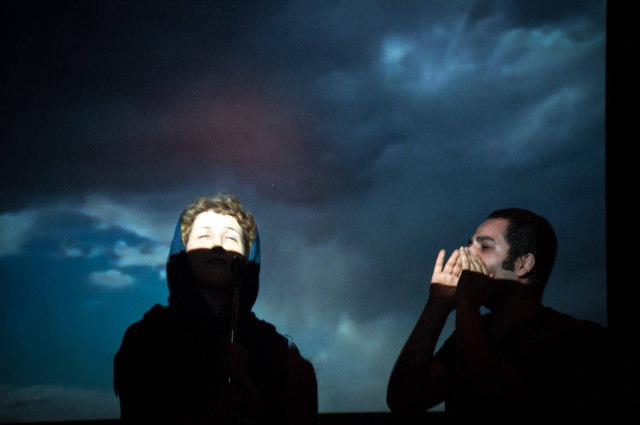
A couple in music and in life, electronic duo NUM tell us in an interview us about the music scenes in Iran (where they come from), Georgia (where they are based now), and how their works are perceived in both of them.
Since our first review of their single back in 2015, several things have happened to the couple duo. They slightly changed the name of the band from “Name” (as you read it in English) to “Num” (which should be read /nʌm/, like “gum”, and it means simply “name”). “We actually didn’t change the name, we just changed the orthography of it to be able to be searchable on the net”, says Milad Bagheri.
They also moved from Rasht, a major city in northern Iran to Tbilisi, Georgia. “The possibility of our work in our city was quite limited,” explains Milad. “The conditions of performance for us were not good. There was no venue for our type of music in Rasht. There were few venues available in Tehran during the year, no stable income, being relentlessly underground, restrictions regarding female vocalists and the risk of having our events cancelled unexpectedly at any time…”
Although Georgia was not an ideal choice, they found it a good place to perform and make music. “Here we can perform and we can have income”, Maryam explains, “We have peace here, so we can produce more. There are lots of good musicians here and there is a constructive competition.”
Change of the environment may have solved some problems, but it brought about new challenges. Maryam explains that their music doesn’t fit well to the music scene in Tbilisi: “Here electronic music means more of a dance music and our music is considered as experimental music”.
“For example this new track, ‘Through My Skin’, is not an experimental piece,” Milad add. “It’s synth-pop or electro-pop, or maybe with a little neglect we can call it experimental-pop. But it’s not an experimental electronic music. While I send it as sample for performance they say that it’s experimental with unusual vocal, but this work has completely has a pop structure”.
This shows that change of the context can change the perception of a work because of difference of societies, tastes and cultural backgrounds. Milad explained that they have two types of works: the ones published on Soundcloud are songs with pop structure and the ones on Bandcamp are the experimental ones.
“Here we can’t perform our real experimental works, the ones that we used to perform in Iran, while our pop works are labeled as experimental. This was totally unpredictable for us”. He continues “I literally heard these words here describing our music: horror and scary, sad and gloomy, and melancholic. Also I heard people saying that for them rhythms are complicated and vocal melodies are not understandable. Maybe it’s because techno music is very popular here and audiences’ ears are used to the simplicity of techno music”.
“What in here and probably in many other places of the world impairs the work of art is being labeled,” he adds. “When it’s been labeled as ‘electronic’ it creates a kind of assumption or expectation for the audiences. They come to hear something that they expect but they hear something else and it surprises them.”
With all of this Milad tries to explain what he thinks of their style: “Nowadays there exist numerous terms to describe music that makes studying styles and genres complicated. I think our works are a mixture of synth-pop, dream-pop and trip-hop, or we may call the avant-pop or experimental pop. In any case they have pop structure. They are songs.
“This new track ‘Through My Skin’ is totally a song. It has verses and chorus, distinctive repetition and its format is like pop songs. But our encounter toward arpeggios, base line and beats is not what we can hear in mainstream pop songs. Because we try not to follow the exact patterns of pop music. We want to have our own standards. But our real experimental works don’t have a song structure and are instrumental.”
The couple duo have changed during these two years. Milad thinks that they’ve matured and Maryam believes they’ve got closer to their own personal language. Being a couple duo, life and professional partners, will effect both the life and the profession. It has advantages and may have disadvantages.
“We met through music and music is part of our relationship and our life.” Maryam explains. “Also working together has helped us to know each other more. Spending so much time together helps our music. It’s much easier to work together like this, comparing to musicians who get together for certain hours.”
“Generally bands that their members live together or spend lots of time together are more successful,” Milad explains, “because creating and producing a collaborative sound which is resultant of all of the members of the group, needs spending lots of time together. Collaborative work is different than writing a song and asking other musicians to come and play different lines of it. We have reached a common perception of life because of living together.”
“It may sound strange,” he adds, “but during these almost 10 years that we are together we never spent a single night without each other. It’s even strange to myself. That’s why I can’t imagine our music something else. I don’t know how it would sound if we wouldn’t live together.”
“On the other hand maybe if we were not making music together we couldn’t be together that long. But at the same time both of us have our own personal projects, so working together doesn’t stop us from having our private worlds.”
*
Photo: Pooyan Shadpoor